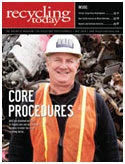Pepsi Commits to Boosting Container Recycling
PepsiCo, headquartered in Purchase, N.Y., has announced its plan to promote beverage container recycling in the United States as part of a series of goals the company has announced in the areas of environmental sustainability and business performance. PepsiCo says it intends to create partnerships to promote the increase of U.S. beverage container recycling rates to 50 percent by 2018. The commitment was developed in cooperation with Walden Asset Management, a self-decribed socially responsible fund manager, and San Francisco-based As You Sow, a foundation that attempts to influence corporate behavior through shareholder engagement. To promote higher rates of beverage container recycling, PepsiCo says it intends to:
- Work with other U.S. industry leaders to support programs and policies that effectively increase recycling;
- Develop U.S. retail customer and consumer programs that support the recycling of beverage containers;
- Partner with its U.S. bottlers, communities, suppliers, governmental entities and non-governmental organizations in support of innovative efforts to encourage increased recycling;
- Educate consumers on the environmental need to and efficiency of recycling;
- Ensure its aluminum, glass and PET beverage packaging is recyclable in U.S. recycling systems; and
- Be the industry leader on the use of recycled content in its primary beverage packaging to ensure a market for recycled beverage containers.
More information on PepsiCo’s environmental sustainability goals is available at www.pepsico.com/goalsand commitments.
Plastic Resin Group Releases Report on Container Life Cycle Analysis
A newly released life cycle inventory of single-serving soda containers, conducted by Franklin Associates for the PET Resin Association (PETRA), New York City, contends that PET (polyethylene terephthalate) plastic bottles offer a better environmental footprint than aluminum cans or glass bottles by using less energy, generating less solid waste and creating fewer greenhouse gases.
The study compared total energy, solid waste and greenhouse gas emissions per 100,000 ounces of soft drinks packaged in typical 20-ounce PET bottles, 8-ounce glass bottles or 12-ounce aluminum cans. The PET bottles showed lower numbers across the board, according to the study.
Franklin Associates says that PET bottles generated lower greenhouse gases than aluminum cans or glass bottles. The company calculates the greenhouse gas emissions for the PET bottles at 1,125 pounds of carbon dioxide equivalents, compared with 2,766 pounds for aluminum and 4,949 pounds for glass.
Energy use for the PET bottles totaled 11 million Btu per 100,000 ounces of soft drink, compared with 16 million Btu for aluminum and 26.6 million Btu for glass, according to Franklin Associates.
Solid waste for the PET bottles totaled approximately 300 pounds versus nearly 800 pounds for aluminum and 4,500 pounds for glass.
The calculations included transporting material to a landfill or incinerator, equipment operations at a landfill and energy recovered by an incinerator.
California Agency Awards Loan to Tire Recycler
The California Department of Resources Recycling and Recovery (CalRecycle) has awarded a $635,000 loan for tire recycling equipment to Tri-C Manufacturing Inc., West Sacramento, Calif. The company says it expects to create 13 new jobs and keep 2.6 million tires out of landfills.
Sponsored Content
Labor that Works
With 25 years of experience, Leadpoint delivers cost-effective workforce solutions tailored to your needs. We handle the recruiting, hiring, training, and onboarding to deliver stable, productive, and safety-focused teams. Our commitment to safety and quality ensures peace of mind with a reliable workforce that helps you achieve your goals.
Funding for the tire equipment loan comes from the Tire Recycling Management Fund.
Tri-C Manufacturing will use the loan to expand its crumb rubber processing operation. The loan also will pay for the completion of a production line that includes a conveyor system, a truck and tractor that meet state emission standards and a cross-belt magnetic separation system.
Get curated news on YOUR industry.
Enter your email to receive our newsletters.

Explore the May 2010 Issue
Check out more from this issue and find your next story to read.
Latest from Recycling Today
- AF&PA report shows decrease in packaging paper shipments
- GreenMantra names new CEO
- Agilyx says Styrenyx technology reduces carbon footprint in styrene production
- SABIC’s Trucircle PE used for greenhouse roofing
- Hydro to add wire rod casthouse in Norway
- Hindalco to invest in copper, aluminum business in India
- Recycled steel price crosses $500 per ton threshold
- Smithers report looks at PCR plastic’s near-term prospects







